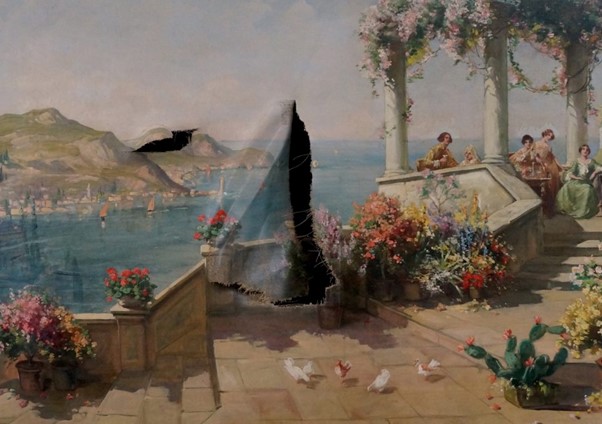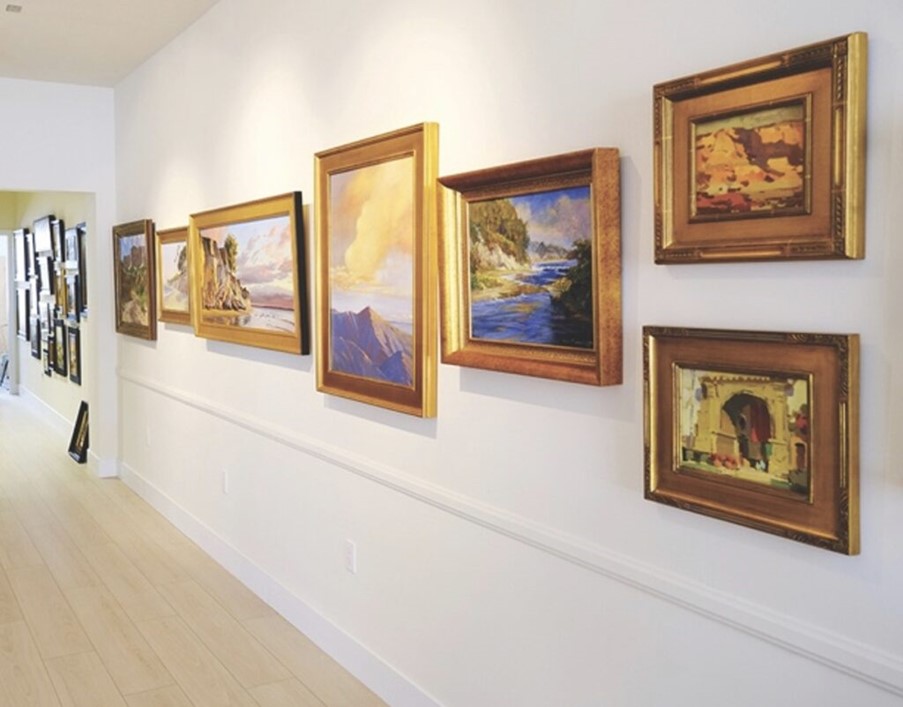Scott M. Haskins is our resident expert in Art Restoration Services provided in Las Vegas and Henderson, Nevada.

Scott M. Haskins in the mural room of his lab.
Here are his words of wisdom about the potential for a ripped painting to be repaired:
As the Head of Conservation at Fine Art Conservation Laboratories, Inc. (FACL), I have seen a lot of damaged artwork in my time. One of the most common questions that I hear from new clients is: “Can a ripped painting be repaired?” Unfortunately, one of the most common causes of damage is paintings falling off the wall, so we have plenty of experience with this issue. Ripped paintings can happen for a variety of reasons, such as earthquakes, storms, other natural disasters, or simply accidental bumps.
If your painting does rip, it is important to have it repaired by a professional art conservator. A conservator will be able to assess the damage and develop a plan to repair it in a way that minimizes the appearance of the tear. The process of restoring a ripped painting will vary depending on the extent of the damage.
However, there are some general steps that conservators will follow:
- Clean the painting: The conservator will start by cleaning the painting to remove any dirt, grime, or other debris. This is important to do so that the conservator can get a clear view of the damage.
- Assess the damage: The conservator will then assess the damage to the painting. This will involve determining the size and location of the tear, as well as the type of paint and canvas that was used.
- Repair the tear: Once the damage has been assessed, the conservator will begin to repair the tear. This may involve using a variety of techniques, such as stitching, patching, or lining.
- Retouch the painting: Once the tear has been repaired, the conservator may need to retouch/ inpaint to match the surrounding area. This will help to minimize the appearance of the repair.
The entire process of restoring a ripped painting can take several weeks or even months, depending on the extent of the damage. It is important to have the painting repaired by a professional to ensure that it is done correctly.

Ripped oil painting of the Amalfi Coast to be repaired perfectly by Fine Art Conservation Laboratories
Here are things to keep in mind when you have a ripped painting:
- If the painting is still on the stretcher, do not remove it. This could cause further damage.
- Do not try to repair the tear yourself. This could cause further damage to the painting.
- Take the painting to a professional art conservator as soon as possible.
How to Deal with A Ripped Painting and an Insurance Claim:
Fine Art Conservation Laboratories’ 45 years of expertise in preserving and restoring art offers invaluable help and practical knowledge for helping people through the insurance claim process for damaged collectibles and art pieces. Our experienced team understands the complexities of insurance claims related to art, heirlooms, and antiques, providing reports that are properly prepared with information that the insurance company never puts in doubt. Fine Art Conservation Laboratories charges flat fees for this work, not a percentage of the claim settlement, and our expertise is honored nationwide. Let us help make the art, heirloom, and collectible part of the insurance claim process as seamless as possible and preserve your peace of mind.
Now, here’s the part where you learn how to prevent your paintings and other valuable items from falling off the wall:
- Use the right hanging hardware: Make sure to use picture hangers that are appropriate for the weight of your painting and the type of wall you are hanging it on. For example, if you are hanging a heavy painting on a plaster wall, you will need to use different hardware than if you are hanging a lightweight painting on a wood wall.
- Use museum wax: Museum wax is a special type of wax that can be used to anchor paintings and other objects to the wall. This is a good option for paintings that are particularly valuable or delicate.
- Hang your paintings in the right place: Avoid hanging paintings near windows or doors, where they are more likely to be bumped or damaged. It is also important to avoid hanging paintings in direct sunlight, as this can cause the paint to fade over time.

Each of these paintings has been secured using the appropriate, secure hardware. No ripped paintings here!
Here are some specific recommendations for hanging:
- Picture-hanging wire attachment on frame: You can find picture hangers at any hardware store, but I recommend using hangers that require multiple screws to attach to the frame. This will provide more security for your painting.
- Hanging hook on the wall: If you are hanging a painting on a plaster wall, I recommend using a brass hook. For wood walls, you can use a silver hook. If you are concerned about earthquakes, you can use an earthquake-proof plastic hook.
- Museum wax: You can find museum wax at most art supply stores. It is important to note that museum wax is not a permanent solution, and you will need to reapply it every few months.
In addition to the above tips, it is also important to regularly inspect your paintings and hanging hardware for signs of wear and tear. If you see any damage, be sure to repair it immediately.
If you have any further questions about how to keep your paintings and other valuable items from falling off the wall, please feel free to contact me. I am always happy to help. Our phone number is 702-757-3820.
Additional tips for Las Vegas and Henderson residents:
- Consider the climate: Las Vegas and Henderson have a dry climate, which can be damaging to paintings and other objects. To protect your artwork, I recommend keeping it in a humidified environment. You can do this by using a humidifier or by placing your paintings in a room with plants, but I recommend speaking to a professional about this first – too much humidity can also damage artwork.
- Be careful about pests: Las Vegas and Henderson are home to a variety of pests, such as termites and silverfish. These pests can damage paintings and other objects, so it is important to take steps to control them. You can do this by using pest control products or by sealing your home to prevent pests from entering.
This blog post has been syndicated at ExpertClick.com.
What does it mean that this article is “syndicated”?
It’s a bit of a coup to get an article syndicated, and it’s certainly prestigious, as additional “proof” that the info and the author are considered far and wide authoritative and an expert in the field. So, enjoy and trust our content!! This article was syndicated for USA National Redistribution.
When something is published, usually by a news source, and is made available through different venues for redistribution then it is said to be syndicated. Publications that are syndicated are usually considered of value as being from an expert, educational, new worthy, or valuable for wide popular interest. See the syndication page at the renowned publicity site: https://www.expertclick.com/NRWire/
This website’s syndication included:
1) Included in the ExpertClick Press Room as a ‘press release.’ (different than a ‘news release’)
2) Included in the ‘Speaker Bureau Platform Page.’
3) Shown on the front page of ExpertClick, in rotation with other most recent posts.
4) Shown in the ‘News Release Results page.’
5) Included on optimized for searches on all my topics of expertise.
6) Shown via RSS linked from the Press Room. (A specific way news is actively distributed within the industry)
7) Shown in the full RSS feed from ExpertClick. (Another, different specific way news is actively distributed within the industry)
8) Syndicated to LexisNexis.com As of 2006, the company had the world’s largest electronic database for legal and public-records related information, distributor of academic content and expert opinion.
This article has been syndicated at https://www.expertclick.com/NRWire/